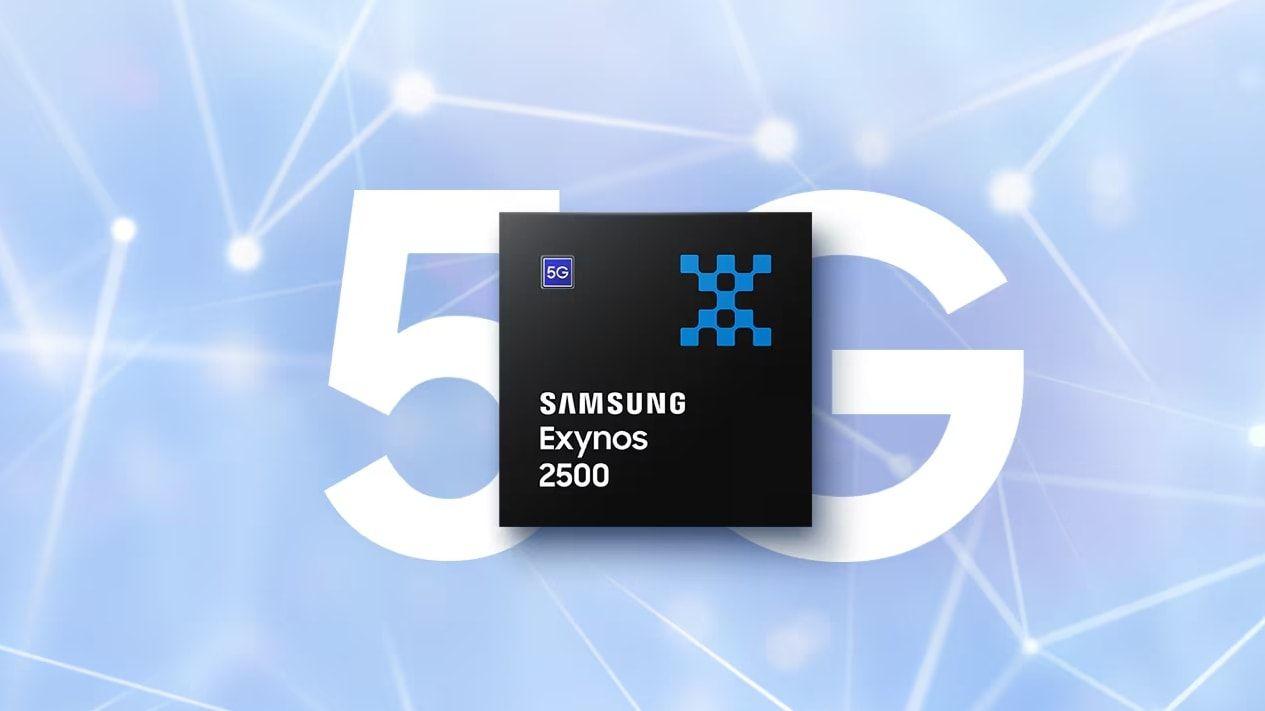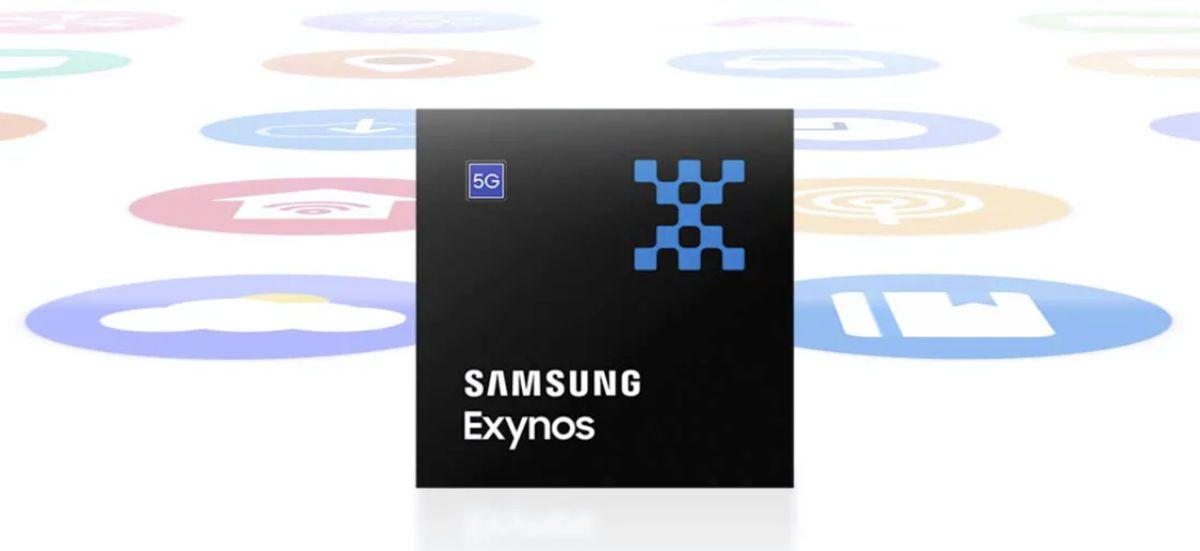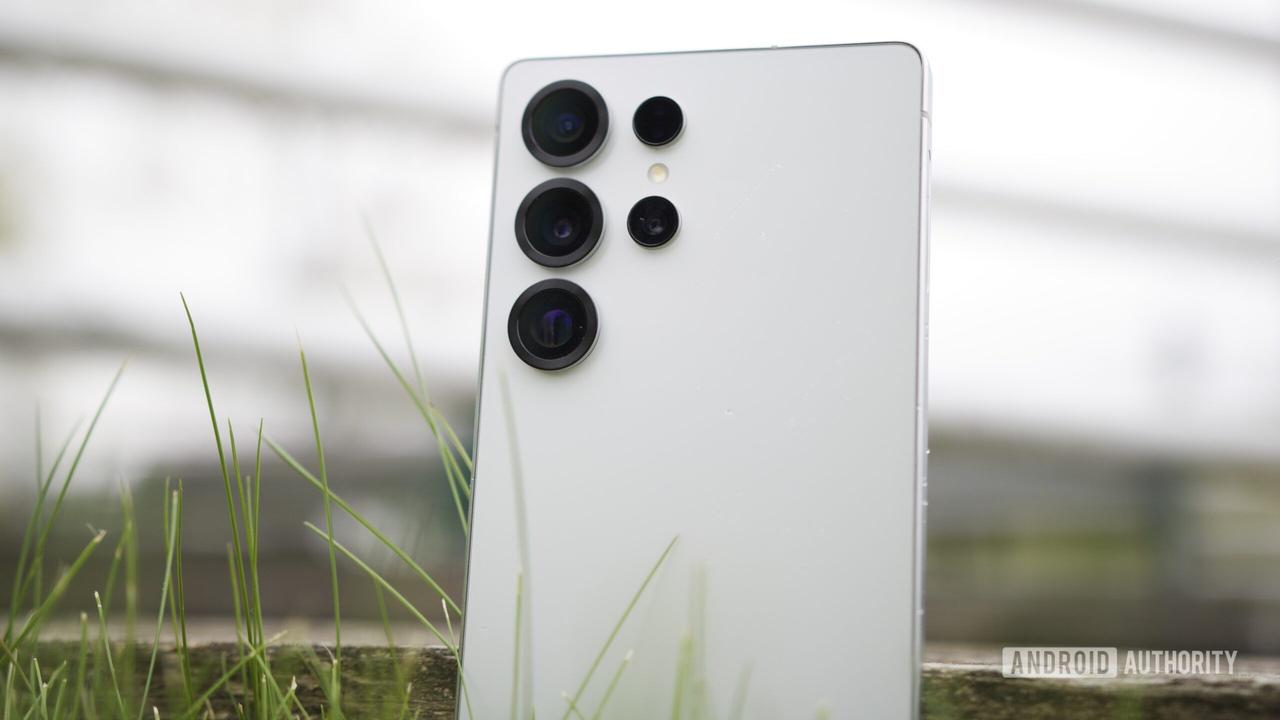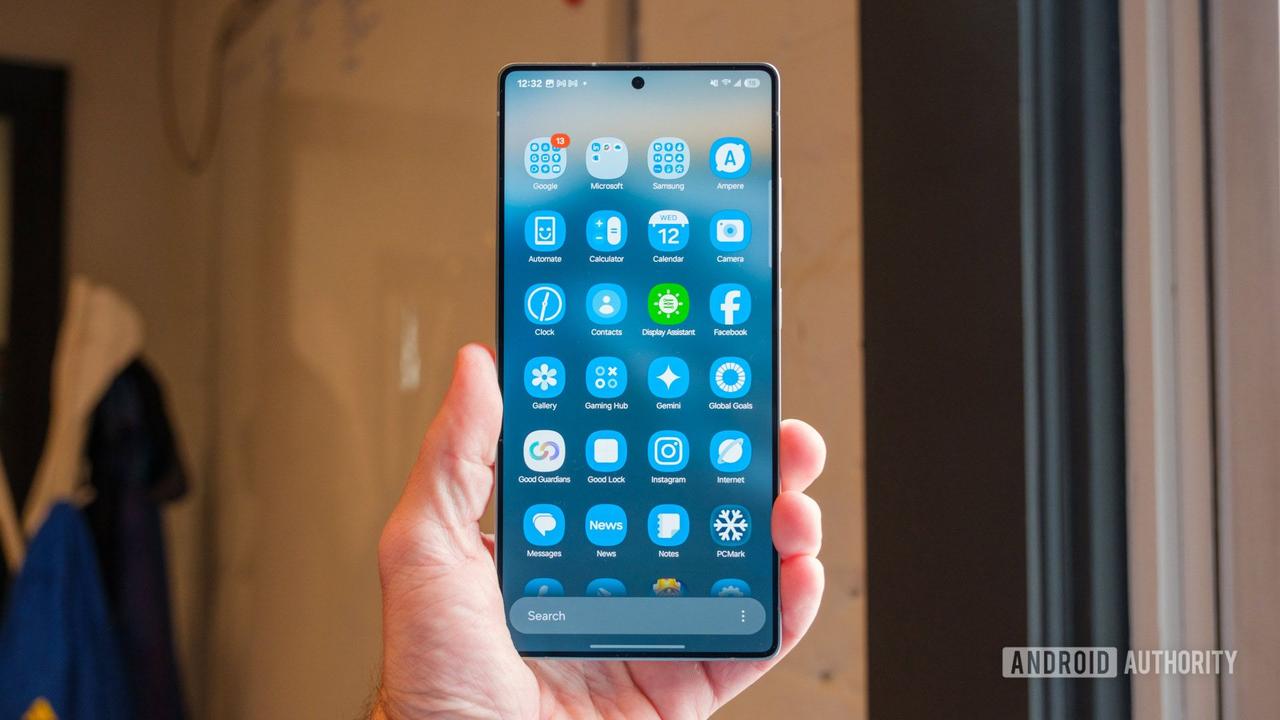Samsung's Exynos 2600: A Potential Game-Changer for the Galaxy S26 Ultra
7 Sources
7 Sources
[1]
Galaxy S26 Ultra might pack a surprisingly powerful Exynos chip
For the last few years, Samsung equipped its flagship Ultra phones with Qualcomm's top-of-the-line Snapdragon chip. Sometimes, it used its in-house Exynos chips on the regular and Plus variants, but starting from the S23 Ultra, it exclusively used Snapdragon on Ultra models. The upcoming Galaxy S26 Ultra might change this trend, with a Korean report indicating Samsung might equip it with the Exynos 2600. A report from Yonhap News, citing "industry sources," claims Samsung's LSI division will start the mass production of Exynos 2600 in November. Apparently, the chip will deliver 6x faster AI performance than even the iPhone 17 Pro's A19 Pro SoC. It also supposedly delivers 15% faster multi-core CPU performance, with the GPU delivering 75% higher scores in some benchmarks. Even compared to Qualcomm's newest Snapdragon 8 Gen 5 Elite, the Exynos 2600 seemingly features a 30% faster NPU and 29% more powerful GPU. Given that the A19 Pro and Snapdragon 8 Elite Gen 5 are currently among the fastest mobile chipsets, matching their performance in AI, CPU, and GPU loads would be a massive win for Samsung. Beating them would be even more impressive, especially considering the underwhelming performance of the last few Exynos chips. A key reason behind the massive performance boost is the decoupling of the modem from the chipset. Samsung has always integrated its modem directly into the SoC, leading to considerable space and power savings. However, with the Exynos 2600, Samsung is reportedly decoupling the modem from the main chip. This change frees up more space within the AP (application processor) for the CPU, GPU, and NPU, potentially resulting in better overall performance. The chip will also be fabricated on Samsung's newest 2nm process node, enabling denser packaging and improved power efficiency. The last few years, Samsung's foundry has struggled with yield issues, but that does not seem to be the case with this node. Is Exynos finally making a comeback? Given how disappointing Samsung's last few Exynos chips have been, this report paints an overwhelmingly positive picture of the upcoming Exynos 2600. In fact, it almost sounds too good to be true. Unless more reputable sources can back up these claims with evidence, I'd recommend taking the alleged performance claims with a pinch of salt.
[2]
Galaxy S26 series, including Ultra, reportedly switches to Exynos 2600 that's faster than Snapdragon
According to a new report, Samsung's Galaxy S26 series will go all-in on Exynos chips including on the top-end Ultra model, as Exynos 2600 prepares a powerful offering. A report from Hankyung (via @Jukanlosreve) reveals that Samsung's Exynos 2600 chipset is very powerful. The Exynos 2600 chip is said to pack slightly better CPU performance compared to even Apple's A19 Pro chipset with a GPU that's up to 75% better. The biggest improvement is in the NPU for AI, though, which is said to be 6x faster than Apple's chip. It's also faster than the Snapdragon 8 Elite Gen 5 in both the GPU and NPU to the tune of roughly 30% each. Exynos 2600 will be produced on Samsung's 2nm process. As a result, Samsung is apparently going all-in on Exynos for the Galaxy S26 series, with the entire lineup - including the Galaxy S26 Ultra - using Exynos 2600 in place of Snapdragon. Samsung often uses Exynos on the base and Plus models in its lineup, but the Ultra tier has been using exclusively Snapdragon chips since 2022, so this is a big shift in Samsung's chip efforts. That said, the report notes that Samsung may still use Snapdragon chips in the Galaxy S26 series sold in the North American market to "ensure smooth local regulatory approvals." So, US users are still likely to see the Galaxy S26 series running on Qualcomm's Snapdragon 8 Elite Gen 5 rather than Exynos. Another report from KEDGlobal adds that Japan and China will also be markets that, like the US, will get Snapdragon chips. It's worth noting, though, that rumors around Exynos vs Snapdragon are often a roller coaster to follow, with lots of back and forth, "will they, won't they" in regards to Samsung's strategy. So take this all with a grain of salt as the launch approaches. The Galaxy S26 series is expected to launch in January.
[3]
Samsung Galaxy S26 Ultra may not come with a Snapdragon chipset after all -- and this hasn't happened for 4 years
We know that the Samsung Galaxy S26 series is coming, but the rumors we've been hearing this year have been all over the place. The latest batch throws another wrench into the works, potentially changing what we know about the upcoming phones' chipsets. In fact, this could see the Ultra model get a Samsung-made Exynos chip for the first time since the Galaxy S22 Ultra. According to a report from Korean site Yonhap News, Samsung is set to begin mass production of the Exynos 2600 chipset in November. This is not exactly news, since we've heard rumors about the Galaxy S26 and S26 Plus coming with this specific Exynos chip outside the U.S. But the key thing here is that the site claims the 2600 will also be used in the Galaxy S26 Ultra. Samsung's use of Exynos chips has been rather inconsistent. The past few years have seen more of a reliance on Qualcomm's Snapdragon chips, but Exynos chips haven't completely vanished. Some non-Ultra models outside the U.S., like Galaxy S24 and S24 Plus, have featured Exynos chips -- but the Ultras have utilized the latest Snapdragon chipsets all over the world. Switching back to Exynos is quite a big deal, especially since the chips have historically offered worse performance than their Qualcomm-made rivals. However, Yonhap News claims that the new 2600 chip should solve that issue. The report claims that the Exynos 2600's neural processing is six times higher than Apple's A19 Pro. This should prove incredibly useful for generative AI. CPU performance is reportedly 15% higher than the A19 Pro, while GPU performance is said to be up by 75% "in some benchmarks." As for the newly-announced Snapdragon 8 Elite Gen 5, Yonhap News reports that the 2600 offers 29% better GPU performance and 30% better with the NPU. There's no mention of the CPU performance, though, and I can't decide whether that's a red flag or not. For those of you in the U.S., none of this is likely to matter. Samsung has always consistently offered Qualcomm chips on the flagship Galaxy S lineup, and rumor has it that it will be continuing this habit with the Galaxy S26 series. We're not going to find out just how much of a difference there is until the Galaxy S26 series is released -- which should happen in early 2026. In the meantime, you can keep up to date with all the latest news and rumors by checking out our Samsung Galaxy S26 and Samsung Galaxy S26 Ultra hubs.
[4]
The Samsung Galaxy S26 Ultra might not pack the power you're expecting
What's happened? A new report out of South Korea says Samsung plans to run its in-house Exynos 2600 across the entire Galaxy S26 lineup, Ultra included. If it sticks, there would be no Snapdragon option for any S26 model. Yonhap says development is complete, with mass production set to start in November. It would be the first Ultra with Exynos since the S22 Ultra, a four-year gap. The chip uses Samsung's 2 nm process and a split modem that frees space for CPU and GPU. SamMobile echoes that insiders expect Exynos across the range, not just the base phones. This is important because: The company is talking about more than a next-gen chip announcement. The pitch is a jump in local AI and graphics that could reset expectations for Ultra-class performance. Samsung's internal tests reportedly put neural processing unit (NPU) performance for generative AI at more than six times Apple's A19 Pro. Design changes, including a standalone modem and the 2 nm node, are cited as the basis for those gains. Recommended Videos Why should I care? If more AI runs on the phone itself, everyday tasks feel snappier and less dependent on the network. You get results right away, and you don't have to ship as much data to the cloud. The NPU targets on-device work such as text summaries, quick image tweaks, and voice actions. Local processing shortens wait times because work happens on the device, not a distant server. Offline or weak-signal moments become less limiting for travel and commuting. Okay, so what's next? Samsung has not said this on the record. The reports cite industry insiders, and there is no official statement yet on chip choices for the Galaxy S26 lineup. Watch for formal confirmation as production ramps in November and the series approaches its early next year window. Expect Samsung to detail on-device AI features and real-world performance at the S26 unveiling if the plan holds.
[5]
Exynos 2600 Crushes Apple's A19 Pro in New Benchmark Leak - Phandroid
Samsung may have finally dethroned Apple in the smartphone chip race with its groundbreaking Exynos 2600. The Exynos 2600 is making waves after new benchmark leaks show how the chipset beats the Apple A19 Pro in several critical areas. According to leaked data, the chip delivers roughly 14 percent higher multi-core performance and up to 75 percent better GPU performance compared to Apple's latest flagship processor. The Geekbench 6 results tell an interesting story. While Apple's A19 Pro scored 3,895 in single-core and 9,746 in multi-core tests, Samsung's chip posted an impressive 11,256 multi-core score. Apple still maintains a slight edge in single-core performance, but Samsung has closed that gap while taking a commanding lead in multi-threaded workloads. What makes this even more impressive is the chip's AI capabilities. The neural processing unit is reportedly six times faster than Apple's A19 Pro, which means faster and smarter features like real-time translation and better photos. This aligns with Samsung's strategy to emphasize Galaxy AI features in upcoming devices. Built using Samsung's new 2nm Gate-All-Around process, Samsung's Exynos 2600 beats Apple in becoming the first mass-market 2nm smartphone chip. This manufacturing node delivers improved power efficiency and sustained performance, addressing the thermal throttling and battery life issues that plagued earlier Exynos processors. Samsung's design reportedly includes ten CPU cores featuring Arm's new Lumex C1-Ultra architecture, which boosts speed and efficiency, and AMD's RDNA-based GPU with ray tracing support. If these numbers hold up in real-world testing, this represents a dramatic comeback for Samsung's chipmaking division. The company plans to use the chip in select Galaxy S26 models starting in 2026, potentially giving Apple some serious competition in the flagship processor race.
[6]
Samsung Galaxy S26 Series With Exynos 2600 Could Beat Apple's A19 Pro Chip
Samsung used Exynos chips in its older Galaxy S series smartphones Samsung's Galaxy S26 series is expected to launch early next year with upgrades over the Galaxy S25 series. A new report suggests that Samsung could use its latest in-house Exynos chipset on its upcoming flagship smartphone lineup. The purported Exynos 2600 SoC is expected to outperform Apple's and Qualcomm's latest chips, while offering improved graphical performance and neural processing unit (NPU) performance over the Snapdragon 8 Elite Gen 5 SoC. Meanwhile, an early Geekbench listing of Exynos 2600 places the chip behind current rivals in CPU performance. Exynos 2600-Powered Samsung Galaxy S26 Series Likely in the Works As per a report (in Korean) by Korea Economic Daily, the Samsung Galaxy S26 series will be equipped with the Exynos 2600 chipset. Citing industry sources, the publication states that the company has begun mass production of the lineup. The Exynos 2600 is expected to be installed in approximately 50 percent of the Galaxy S26 units. As per the current strategy, markets like the US, Japan, and China will reportedly receive Galaxy S26 models powered by Qualcomm chipsets, while regions such as South Korea and Europe will get the Exynos variants. Samsung used Exynos chips in its older Galaxy S series smartphones, but the company shifted to Qualcomm in recent years, with the Galaxy S23 and Galaxy S25 series dropping Exynos entirely. The return of the Exynos chipset with the Galaxy S26 series is expected to deliver improved chip performance and better foundry yields. The Exynos 2600 is made in-house by Samsung Foundry, whereas Apple and Qualcomm rely on TSMC. Expanding Exynos use could help Samsung cut costs and boost its struggling foundry and system LSI units. The South Korean report suggests that Exynos 2600 outperforms top rivals in internal tests. Its NPU is reportedly over six times faster than Apple's A19 Pro, with 14 percent better CPU multi core performance and up to 75 percent higher GPU performance. The Exynos 2600's NPU performance is said to be about 30 percent faster compared to the Snapdragon 8 Gen 5 SoC. The GPU is reportedly up to 29 percent better than Qualcomm's flagship chipset. The Exynos 2600 is reportedly built based on Samsung Foundry's 2nm process. While most global Galaxy S26 models will reportedly launch with Exynos, North American versions of the phones will feature Qualcomm chips to meet local certification needs. Samsung reportedly focused on improving AI performance while developing the Exynos 2600. Exynos 2600 CPU Performance Revealed via Geekbench Meanwhile, the Exynos 2600 was spotted on the Geekbench database with model number S5E9965. The new benchmark listing suggests a 3,047 single-core score and a 10,025 multi core score. The listing reveals a CPU setup with 6+3+1 architecture, with six cores capped at 2.46GHz. Three cores are clocked at 2.96 GHz, while the prime core is capped at 3.55 GHz. Geekbench scores hint at a potential setback for the Exynos 2600 in terms of CPU performance. Despite rumours about the superior performance, early benchmark results place the chip behind current rivals. In comparison, the Snapdragon 8 Elite Gen 5 scored 3,675 in single-core and 11,096 in multi core tests. Last year's Snapdragon 8 Elite had 3,186 points in single-core testing and 10,042 points in multi core testing.
[7]
Samsung Galaxy S26 Ultra: Why the 2026 Flagship is Already Worth the Hype
The Samsung Galaxy S26 Ultra, powered by the advanced Exynos 260 chip, represents a significant step forward in Samsung's quest to reclaim its position as a leader in the competitive smartphone market. With a focus on performance, efficiency, and design, the S26 Ultra introduces a range of innovations aimed at setting new standards for flagship devices. By directly challenging industry giants like Apple and Qualcomm, Samsung is positioning the S26 Ultra as a device that redefines what users can expect from a premium smartphone. At the heart of the Galaxy S26 Ultra lies the Exynos 260 chip, a new development in Samsung's processor lineup. This chip addresses past criticisms of Samsung's in-house processors by delivering substantial improvements in key areas. The Exynos 260 achieves: These advancements position the Exynos 260 as a serious competitor, outperforming Qualcomm's Snapdragon 8 Gen 5 Elite in AI processing by 30% and graphics performance by 29%. This level of performance is made possible by its innovative architecture, which separates the modem from the main chip. This design not only improves power efficiency but also reduces heat generation, making sure consistent performance under heavy workloads. The Exynos 260 is manufactured using Samsung's innovative 2-nanometer process technology. This process enhances energy efficiency, allowing the device to deliver longer battery life while maintaining high performance. By addressing both performance and efficiency, the Exynos 260 sets a new benchmark for mobile processors. Samsung has refined its flagship offerings with the Galaxy S26 series, simplifying the lineup to three models: Base, Plus, and Ultra. By eliminating the Pro and Edge variants, Samsung has adopted a more focused approach, making it easier for consumers to identify the model that best suits their needs. This streamlined strategy reflects Samsung's commitment to clarity and user-centric design. The Galaxy S26 Ultra, codenamed "Miracle," stands as the pinnacle of this lineup. It continues Samsung's dual-chip strategy, with the Snapdragon 8 Gen 5 Elite powering the Ultra in global markets, while the Exynos 260 is reserved for select regions. This approach allows Samsung to use the strengths of both chips, catering to diverse market demands while showcasing the capabilities of its proprietary technology. The Ultra model also features a refined design, incorporating premium materials and a sleek form factor. This attention to detail underscores Samsung's dedication to delivering a flagship device that excels in both aesthetics and functionality. The Galaxy S26 Ultra is engineered to deliver exceptional performance, with a focus on AI-driven enhancements, energy efficiency, and seamless hardware-software integration. The advanced architecture of the Exynos 260 chip enables the device to handle demanding tasks effortlessly, from AI-powered applications to intensive gaming and multitasking. Samsung has also prioritized heat management, addressing a common pain point for high-performance smartphones. The improved thermal design ensures that the S26 Ultra maintains consistent performance even during prolonged use. These upgrades not only enhance the user experience but also demonstrate Samsung's commitment to pushing the boundaries of what flagship devices can achieve. In addition to raw performance, the S26 Ultra introduces features that use its AI capabilities, such as smarter camera processing, real-time language translation, and enhanced voice recognition. These innovations highlight the practical benefits of the Exynos 260's AI advancements, making the device more intuitive and user-friendly. The launch of the Galaxy S26 Ultra represents a pivotal moment for Samsung, particularly in its efforts to rebuild the reputation of the Exynos brand. By focusing on AI capabilities, efficiency, and raw performance, Samsung aims to restore consumer confidence in its proprietary technology. The Exynos 260 serves as a testament to Samsung's ability to innovate and compete at the highest level. This device also signals Samsung's intent to challenge Apple and Qualcomm more directly. The combination of hardware and software improvements positions the S26 Ultra as a formidable competitor in the premium smartphone market. By delivering a cohesive and powerful user experience, Samsung is reinforcing its commitment to innovation and excellence. The Galaxy S26 Ultra is more than just a technological achievement; it is a strategic statement from Samsung. By integrating innovative technology with a renewed emphasis on performance and efficiency, the S26 Ultra has the potential to reshape the competitive landscape of flagship devices. Its streamlined lineup and focus on user-centric design reflect a clear vision for the future. While the ultimate success of the S26 Ultra will depend on real-world performance and consumer reception, the advancements in the Exynos 260 chip and Samsung's product strategy suggest a promising trajectory. As the smartphone market continues to evolve, the Galaxy S26 Ultra could play a key role in reaffirming Samsung's position as a leader in innovation. This device not only sets new standards for flagship smartphones but also underscores Samsung's commitment to delivering products that meet the needs of modern consumers. Discover other guides from our vast content that could be of interest on Samsung Galaxy S26 Ultra.
Share
Share
Copy Link
Samsung's upcoming Exynos 2600 chip shows promising performance, potentially outperforming Apple and Qualcomm. The Galaxy S26 Ultra might feature this powerful in-house processor, marking a significant shift in Samsung's chip strategy.
Samsung's Exynos Comeback
Samsung's upcoming Exynos 2600 chip is making waves in the tech industry, with reports suggesting it could be a game-changer for the company's flagship smartphones. According to multiple sources, the new chip is set to deliver impressive performance gains, potentially outpacing both Apple and Qualcomm's latest offerings
1
2
3
.
Source: Gadgets 360
Performance Leap
The Exynos 2600 is rumored to offer significant improvements across the board. Reports indicate that it may deliver 15% faster multi-core CPU performance and up to 75% higher GPU scores in some benchmarks compared to Apple's A19 Pro
1
3
. Even more striking is the claim that the chip's AI performance could be six times faster than Apple's offering, which could revolutionize on-device AI capabilities2
4
.
Source: Phandroid
When compared to Qualcomm's Snapdragon 8 Elite Gen 5, the Exynos 2600 is said to feature a 30% faster NPU and a 29% more powerful GPU
1
. These performance gains, if accurate, would represent a massive leap forward for Samsung's chip division.Technical Innovations
Several factors contribute to the Exynos 2600's reported performance boost:
-
2nm Process Node: The chip will be fabricated using Samsung's newest 2nm process, enabling denser packaging and improved power efficiency
1
2
. -
Decoupled Modem: Unlike previous Exynos chips, the 2600 will reportedly separate the modem from the main chip, allowing more space for CPU, GPU, and NPU components
1
4
. -
Advanced Architecture: The chip is said to include ten CPU cores featuring Arm's new Lumex C1-Ultra architecture and an AMD RDNA-based GPU with ray tracing support
5
.
Implications for the Galaxy S26 Series
In a surprising twist, reports suggest that Samsung might equip the entire Galaxy S26 series, including the Ultra model, with the Exynos 2600
2
3
. This would mark a significant shift in Samsung's strategy, as the Ultra models have exclusively used Snapdragon chips since 20223
.
Source: 9to5Google
However, it's worth noting that Samsung may still use Snapdragon chips in certain markets, particularly North America, Japan, and China, to ensure smooth regulatory approvals
2
4
.Related Stories
Industry Impact
If the reported performance figures hold true in real-world testing, the Exynos 2600 could represent a dramatic comeback for Samsung's chipmaking division
5
. This development has the potential to shake up the smartphone industry, offering stiff competition to both Apple and Qualcomm in the high-end mobile processor market.Cautionary Note
While these reports paint an exciting picture for Samsung's future chips, it's important to approach the claims with some skepticism. As noted by some sources, the performance figures seem almost too good to be true, given the historical performance of Exynos chips
1
3
. We'll need to wait for independent testing and benchmarks to confirm these claims once the chip is officially released.1
2
3
5
References
Summarized by
Navi
[1]
[2]
[3]
[4]
Related Stories
Samsung unveils Exynos 2600, world's first 2nm smartphone chip set to power Galaxy S26 series
19 Dec 2025•Technology

Samsung's Exynos 2600 Chip Promises Revolutionary Camera Upgrades for Galaxy S26 Series
06 Nov 2025•Technology

Samsung Galaxy S26 Ultra Rumored to Feature Cutting-Edge RAM for Enhanced Performance
09 Aug 2025•Technology

Recent Highlights
1
ByteDance's Seedance 2.0 AI video generator triggers copyright infringement battle with Hollywood
Policy and Regulation

2
Demis Hassabis predicts AGI in 5-8 years, sees new golden era transforming medicine and science
Technology

3
Nvidia and Meta forge massive chip deal as computing power demands reshape AI infrastructure
Technology





